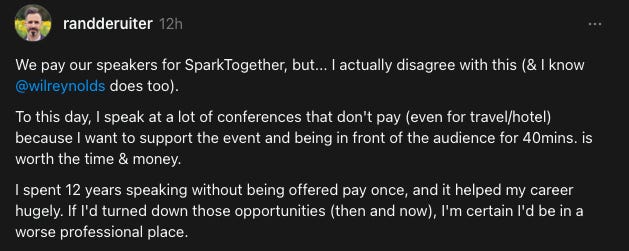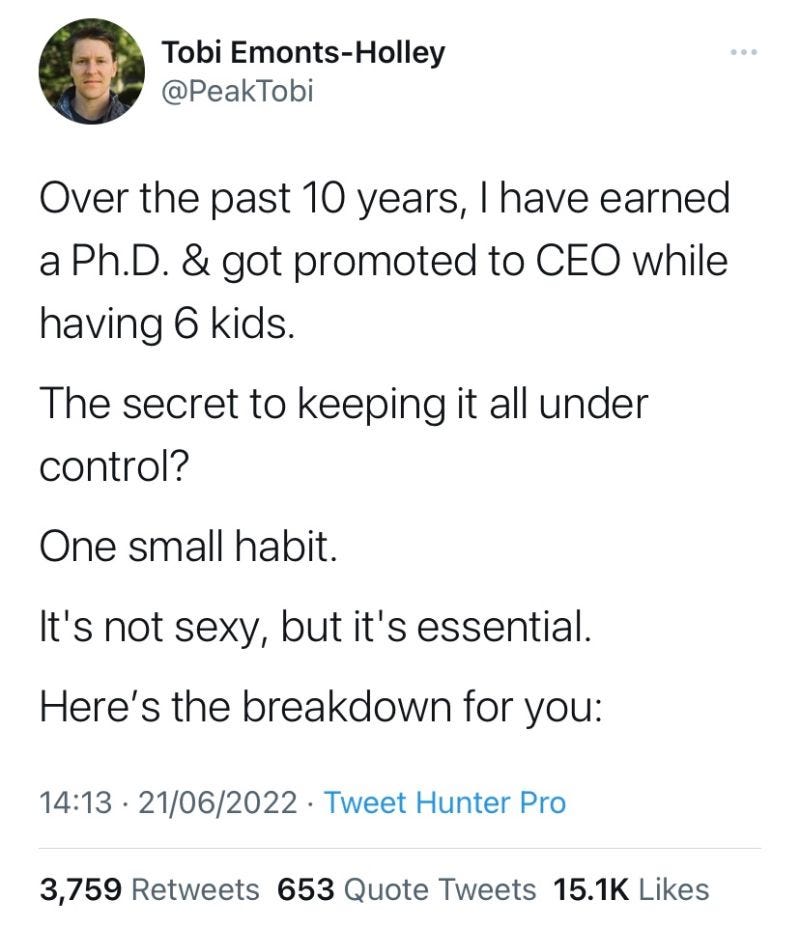I've been firmly in the camp of "pay people for their expertise" for a long time. The job market has become rife with companies expecting massive projects from candidates, without compensation.
For some, that requirement immediately creates a barrier to entry: who can afford a lot of unpaid time (upwards of 8 hours — a full day of work), just for the opportunity to move forward to the next stage of an interview? Perhaps a laid-off person has time to do that (multiplied by however many applications), but for someone trying to leave an existing job, it's a lot to ask.
Companies may not realize that asking for unpaid labor creates a diversity and equity issue. And therein lies the problem: that they don't think about how unpaid labor creates a divide between those who can afford to give such time and those who can't.
Recently, I came across the following comment on Threads from Rand Fishkin, co-founder/CEO of SparkToro and founder and former CEO of Moz. He was replying to a discussion about paying speakers at conferences.
I pointed out — as did others — that speaking at a conference for free and without paying for travel expenses is a privilege. Not everyone can afford that — even in the name of "career advancement," as Fishkin gives as a reason why he did it for many years. Paying speakers, and paying experts for their time in all situations, is how a diverse range of experiences are heard and considered.
We're not all at the same starting line
Ironically, this was all in response to an initial post made by Women in Tech SEO — with the comment that the group pays all speakers because "it's the right thing to do."
In an article for Forbes, behavioral scientist and author Dr. Pargya Agarwal writes:
When we talk about empowering women and making such events and speaker panels inclusive, it matters whether the speakers are being paid or not. Research has shown that this increases the gender pay gap and decreases the opportunities available to women.
It is often the women who carry the mental and physical load of family and caring responsibilities. It is the women who are less likely to be able to afford to accept an unpaid speaking engagement.
Fishkin has had a successful career (which he's written about). But based on his comment, at some point, he was offered a speaking engagement for no money and no travel reimbursement, and he had the ability to say yes. He continued to say yes to these opportunities as they arose. They put him further ahead, and, by his own admission, he'd "be in a worse professional place" without them.
This disparity goes back even further to unpaid internships in college. The National Association of Colleges and Employers finds that "students who take part in paid internships receive more job offers and garner higher starting salaries than those who participate in unpaid internships."
Squarespace CMO Kinjil Mathur lauded the doors opened by unpaid work in an interview. She said, "I went to the business listings and I just started calling up companies and asking them if they had internships available and that I'd be willing to work for free." Eventually, her first "foot in the door" was unpaid admin and research work for Travelocity.
Only a certain segment of the population can afford to take an unpaid internship, especially if they're working their way through college (If they can even afford college at all). Unpaid work, from unpaid internships, to unpaid projects for job applications, to unpaid speaking engagements, is perpetuating inequalities in the workplace. And it doesn't have to be that way. Companies can simply pay people for their work. The company is benefitting from — and even profiting from — free labor.
I noted in Fishkin's reply (and in a follow-up comment) that he speaks for free to support an organization and that smaller orgs or non-profits may not be able to afford speakers. Non-profits are certainly a different category. But it's conflating two concepts: the ability to work for free because one has the means to do, and giving back because one has the means to do so.
I regularly get DMs from people asking for a 30-minute call. Usually, it's an earlier stage freelancer, and they're hoping to chat and learn something. I used to take these calls, because I wanted to "pay it forward," but eventually, they became too numerous. There was no way for me to filter through and give my attention to some people, and not others. As a self-employed person, my time is literally money that I can otherwise spend doing client work.
Some people have likely reached a point in their careers where they are comfortable and able to give back to others. That should, of course, be celebrated since it can advance other people's careers through mentorship or enhance a conference by donating one's time.
But make no mistake that there's a big difference between giving back to help other people and donating time to enhance one's own career. They shouldn't be part of the same conversation.
Comparison can be crushing
This topic of "who is able to enhance their careers" has long caught my attention. I know the starting line isn't the same, but there's a lot we could do to remove some barriers. It's why I talk so much about flexible work, because I think flexibility is paramount for creating more equity in the workplace. I'm a big proponent of pay transparency, because I think we can do better with more information.
Because comparison is rampant on The Internet, we often mistakenly think we all have the same (or similar) resources. We don't. We may not have had the resources to take an unpaid internship or do other unpaid work early in our careers, no matter how much we may have wanted to. I certainly couldn't have worked for free in college. I needed money. I was lucky that my job at a local community bank led to a career in banking, but that certainly wasn't the reason I took the job.
A few years ago, Tobi Emonts-Holley, a CEO and life coach, posted the following on Twitter (back when it was still Twitter):
His thread proceeded to talk about his weekly review, checking all his to-dos, cleaning out his inboxes, and planning for the upcoming week. Not once did it talk about taking care of his six kids or, presumably, the wife who helped raise those kids while he was off CEO-ing and maintaining his weekly productivity schedule. (He later published a follow-up that he didn't intend to downplay his wife's "incredible support, care, and devotion to our family" after some well-deserved backlash.)
It's important to maintain perspective, at any stage of your career — especially if you're tempted to compare your career growth to others. What else do those people have going on in their lives? Did they have access to opportunities that a lot of other people simply wouldn't have access to? Did their network give them an "in"?
I find myself struggling with this at times, with people who proclaim that you need to hustle and work 12 hours per day and take cold showers to crush your goals. I'm tempted to get down on myself, thinking I should be doing more. And then I remember: I do work long days. But it's not just work-work. It's also time spent "working" on my family and meeting their needs. Even with a supportive spouse, it's a lot with three kids.
The days we experience are all drastically different. My days are different than someone with chronic health issues. Someone without kids. Someone who simply had different opportunities at different stages of their career than me.
We need to recognize that we can't single-handedly fight the systems that we're in. We just can't. The only thing we can do is acknowledge what's possible and realistic for us.
What to read next:
If you love this newsletter and look forward to reading it every week, please consider forwarding it to a friend or becoming a subscriber. Subscribers get access to additional stories I publish.
Have a work story you’d like to share? Please reach out using this form. I can retell your story while protecting your identity, share a guest post, or conduct an interview.







Great post and spot on with regard to what I've experienced in 40 years in the workplace. People should be paid for their work and speakers should be paid too.
After all, conferences charge high prices to attend, why should speakers work for the conference organizers and not themselves. Of course, speaking at a conference looks good on your cv, LinkedIn profile and at work but as you say, not everyone can take the leave to do this. Or take the early start and late finish (networking dinners, nibbles and wine from 5.00 pm etc.) to take full advantage of the opportunity.
Re the post from Toby, I've seen so many similar posts from men who clearly either have a wife or paid help. And no, I don't want a cold shower at 5.00 am. I want a hot shower where I can wash & condition my hair, use my face scrub and relax.
Great post and spot on with regard to what I've experienced in 40 years in the workplace. People should be paid for their work and speakers should be paid too.
After all, conferences charge high prices to attend, why should speakers work for the conference organizers and not themselves. Of course, speaking at a conference looks good on your cv, LinkedIn profile and at work but as you say, not everyone can take the leave to do this. Or take the early start and late finish (networking dinners, nibbles and wine from 5.00 pm etc.) to take full advantage of the opportunity.
Re the post from Toby, I've seen so many similar posts from men who clearly either have a wife or paid help. And no, I don't want a cold shower at 5.00 am. I want a hot shower where I can wash & condition my hair, use my face scrub and relax.